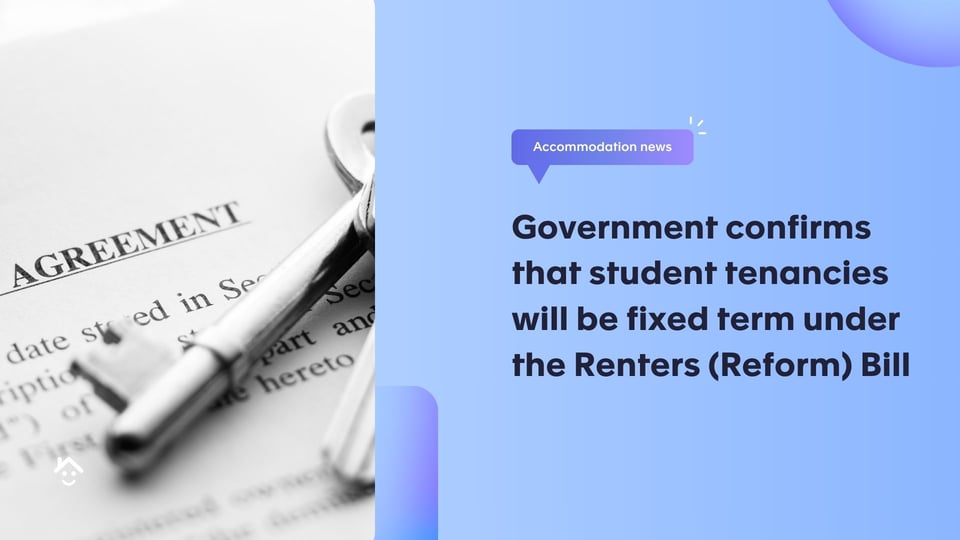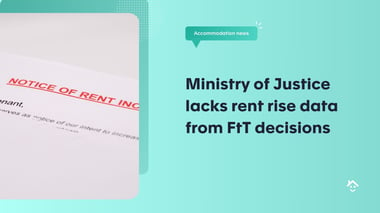There was more clarity about the new possession grounds for student landlords which were discussed at the Bill's report debate in Parliament.
The Renters (Reform) Bill still needs a third reading in the Commons before it heads to the Lords where the amendments will be discussed - and others potentially be added.
The Bill originally made all tenancies periodic but there was a provision to exempt tenancies in the purpose-built student accommodation (PBSA) sector.
However, after representations were made by various organisations representing student landlords who need fixed term tenancies to ensure an empty house for the next academic year, the government has changed tack.
It now says that grounds for possession would see all student tenants being evicted at the same time - but this detail must be in the tenancy agreement they sign.
Students who live in smaller properties or HMOs
Jacob Young, the housing minister, told MPs: "Since introducing that ground, we have heard concerns that the ground will not apply when the students live in smaller properties or in houses of multiple occupation (HMO) on individual contracts."
He said the government amendment now expands the grounds for possession for student landlords.
He added: "Landlords will be able to ensure that properties rented to students, whether they are living individually, or in pairs or in larger shared housing will be vacated in the summer so long as all the tenants on the tenancy agreement are students."
The amendment comes from Antony Magnall MP, and his explanatory statement says: "This amendment would mean that the ground for possession for student properties could also be used for properties occupied by just one or two students, which would not otherwise be considered as HMOs."
New Housing Standard may include EPCs
Student landlords might also be concerned about the possibility of Energy Performance Certificates (EPCs) becoming part of the new Decent Housing Standard.
This follows an intervention by Sheffield MP Clive Betts who asked if EPCs would be part of a standard.
While Mr Young didn't deny they would be, he hinted that EPCs might be included in the future.
Other amendments include:
- Notice to quit: Landlords cannot use the Section 21 'no-fault' eviction ground for the first six months of a tenancy. After six months, the tenancy becomes periodic, and tenants only need to give two months' notice to leave.
- Preventing homelessness: When a valid eviction notice - including Section 8 notices - is served, councils are obliged to prevent homelessness.
- Council guidance: Councils should not advise tenants to stay in a property until a court order is enforced. This practice delays possession, penalises landlords, and creates stress for both parties, Mr Young said.
- Short-term lets: When a landlord repossesses a property for personal use, they cannot immediately re-let it for short-term holiday rentals for three months.
'Bill delivers a fair deal for tenants and responsible landlords'
Before the Renters (Reform) Bill debate took place, Ben Beadle, the chief executive of the National Residential Landlords Association, said: "This Bill delivers a fair deal for tenants and responsible landlords.
"In the interests of certainty for the sector it is now time to ensure the Bill passes through Parliament.
"For renters, the Bill will abolish section 21 repossessions and fixed term tenancies, introduce a Decent Homes Standard for the sector, a new Ombudsman and Property Portal which landlords will have to join as well as measures to protect families and those in receipt of benefits from discrimination."
He added: "Going forward, it will always be for the courts to decide if landlords have met the threshold to repossess a property based on a series of legitimate reasons.
"This includes tenant anti-social behaviour, serious rent arrears or where a landlord plans to sell a property.
"A number of the amendments proposed to the Bill enact recommendations by the cross-party housing select committee.
"Taken together they would ensure a balanced Bill that protects tenants and ensures it is viable for responsible landlords to continuing renting properties out."
Sensible and logical amendments
Oli Sherlock, Goodlord's managing director of Insurance, said: "There are some sensible and logical amendments on track to be debated during the third reading of this Bill.
"The biggest talking point for most will be regarding Section 21; looking at how and when the government will abolish the measure.
"It is imperative that our legal system can manage cases effectively and efficiently, however there seems to be little commitment as to how the government will achieve this and, as importantly, the timelines involved."
He adds: "At risk of sounding like a broken record, the industry just needs clarity on details and timelines.
"Landlords, tenants and agents need to know exactly what is changing and when.
"This legislation was promised as part of the Conservative manifesto and the clock is ticking ahead of a General Election, all whilst patience in the market is wearing very thin."
'Most of the government amendments will go forward'
The managing director of Accommodation for Students, Simon Thompson, said: "The debate was interesting and most of the government amendments will go forward.
"There's still time for more amendments as it makes it way to becoming law, so student landlords need to understand what is being discussed."
He added: "It does look like student tenancies will be for a fixed term which will bring a lot of relief to the sector.
"But the abolition of Section 21 evictions, if and when they do take place, will cause some concern."




